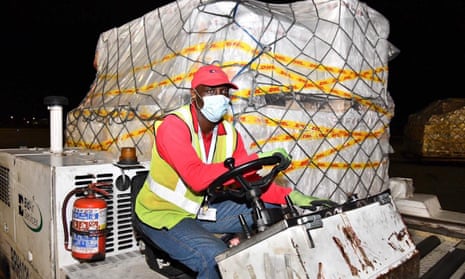African countries have pulled together to set up a one-stop shop to give the continent a fairer chance in the international scramble for Covid-19 test kits, protective equipment and any vaccines that emerge.
The Africa Medical Supplies Platform will work like eBay or Amazon, unlocking access to supplies across the continent, and could save billions of pounds.
South Africa’s president, Cyril Ramaphosa, said it was the “silver lining” to Covid-19, and “the glue that is going to bind the continent together”.
It “will address shortages and security of supply, ensure price competitiveness and transparency in procurement, reduce logistical delays, simplify payment processes and provide a common platform where governments can access services from quality and certified suppliers”, Ramaphosa said during the digital launch.
Ramaphosa spoke in his capacity as African Union chair after tasking Zimbabwean mobile mogul and philanthropist Strive Masiyiwa to come up with solutions to the shortage of test kits.
Lockdowns are already being lifted to stimulate flagging economies even as coronavirus infections are on the rise.
Covid-19 infections were first recorded in sub-Saharan Africa in March, mostly imported from Europe and the US. On Friday, Africa had registered 275,327 cases and more than 7,400 deaths. South Africa alone accounted for more than a third of the recorded infections. Masiyiwa pointed out that, across Africa, the average number of tests per one million people was 1,669 because of a worldwide shortage of kits, compared with 173,029 in Iceland, 44,123 in the US and 31,592 in the UK.

“Testing and lockdown are two sides of the same coin,” Masiyiwa said.
Vera Songwe, executive secretary of the UN Economic Commission for Africa, said lockdowns are losing the continent an estimated $65bn (£52.6bn) a month. “If we can use a third of this amount to test, we don’t have to lock down. This platform could save us $40bn [in losses],” she said.
The platform is set to be run as a non-profit by the Africa Centres for Disease Control and Prevention in Ethiopia and Afreximbank in Egypt, which is already managing a $3.8bn Covid-19 fund for the continent. This fund would be used to cover freight costs so that small and remote countries such as the Seychelles would pay the same prices as Senegal, Masiyiwa said.
Ethiopian Airways and South African Airways will help with shipments to hubs like Addis Ababa and Johannesburg so that volumes can be leveraged to lower costs, Masiyiwa said. While preference will be given to continental suppliers such as South African company Invicta, which has pledged to supply 10,000 inexpensive ventilators, or Senegal’s $1 rapid test kits, supplies will also be shipped from countries like China.
“What we do is demonstrate the power of volume, which we as Africa always have known we can unleash,” Masiyiwa said. Governments experiencing financial difficulties will be able to open credit lines with Afreximbank, while potential international debt forgiveness could go some way towards paying for supplies.
The platform was initially piloted to supply drugs to prevent maternal and child deaths and as an early demonstration of how the yet-to-be-launched African continental free trade area agreement can leverage the collective market of Africa’s 1.3 billion people. The free trade area was supposed to come into effect on 1 July, but this was delayed by six months because of the Covid-19 pandemic.
